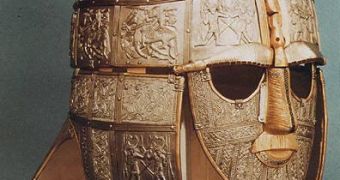In the last period of the Roman occupation, Britain was often raided by the Picts (from modern Scotland) and by pirate expedition of the Germanic tribes. When Romans left at the beginning of the 5th century, Britain fragmented in small kingdom and rival domains, which employed Germanic mercenaries in their inner fights or against the Picts and the Irish.
The legend says that a leader called Vortigen opened the way for the Germanic tribes, employing 2 Saxons, Hengist and Horsa. They subsequently turned against him. Saxons and other Germanic people could have been brought between 425-450 AD. The mercenaries turned into invaders, bringing more of their kin, and Britons retreated to the west.
At Mount Briton (an unidentified place), Britons managed to achieve a great victory against the Saxons, in 500 AD. This event was associated with a remarkable general, whose name was not known, and whose heroic deeds gave birth to the legend of Arthur. Still, by 615 AD, Britons had retreated to the north and west, and later even Cornwall (West Wales) was conquered by Germanic tribes. Scotland, Wales and Ireland remained Briton and Celt (the Celt border). The conquered territory was called Angleland, from the name of one Germanic tribe, Angles.
The invaders came from the northwest coasts of Europe, and belonged to various Germanic tribes: Saxons, Jutes, Angles and Frisians. They gave the name of English regions: Wessex, Essex, Sussex mean "West Saxon (Land)". "East Saxon (Land): "South Saxon (Land)." Despite their different names, linguistic differences between invaders were minor, and they formed a single ethnic group: the Anglo-Saxons.
Around the year 600, 7 independent Anglo-Saxon kingdoms existed in Britain:Wessex, Essex, Kent Sussex, East England, Mercia and Northumbria. This is the moment when Anglo-Saxons started to be Christianized.
The Scots, coming from Ireland, occupied northern Britain, united during the 9th century with the Picts from the East and North and formed Scotland.

 14 DAY TRIAL //
14 DAY TRIAL //